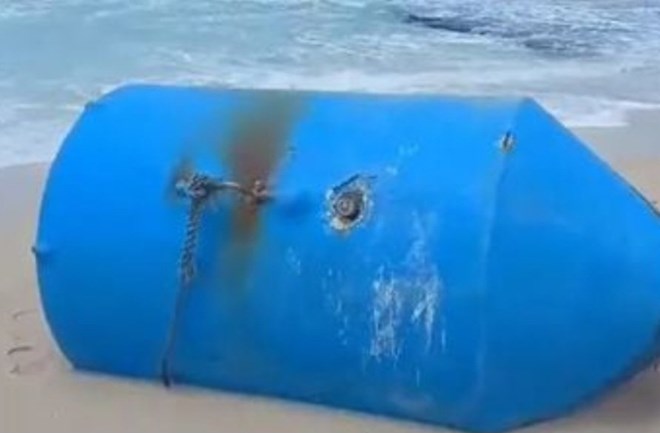
Friday August 2, 2024

Galkayo (HOL) — Puntland police have issued a warning to residents after a sealed barrel, suspected to contain toxic substances, washed ashore on Ilfohshe beach near the town of Jariban, about 900 kilometres northeast of Mogadishu, on July 27, 2024. The sealed blue barrel, with a rope attached, is believed to have been left in the water by individuals illegally dumping hazardous waste.
Authorities are urging residents of Ilfohshe and the Mudug coastline to avoid the barrel due to potential risks from toxins and explosive materials. "Such hazards can pose significant risks to both people and the environment," the police said.
The suspicious container is part of a long-standing issue of toxic waste dumping in Somali waters, which has persisted since the fall of the Mohamed Siad Barre regime in 1991. European companies have been accused of exploiting Somalia's poorly policed waters to dispose of hazardous waste cheaply. In 2009, it was reported that the cost of dumping waste in Somalia was as little as $2.50 per ton, compared to $250 per ton in Europe. Illegal dumping remains a persistent issue. Reports from 2021 indicate that foreign fishing vessels continue to dispose of waste in Somali waters.
In 2004, the United Nations Environment Programme (UNEP) found barrels of unknown material on the Puntland coast, initially believed to be toxic waste from Europe. Although the toxicity of those substances was not confirmed, estimates suggest that up to 35 million tons of waste, including medical, agricultural, nuclear, and industrial waste, have been dumped in Somali waters over the years.
The environmental and health consequences have been severe. Contaminants have led to acute respiratory infections, skin rashes, abdominal hemorrhages, and other health issues among coastal communities. The 2004 tsunami exacerbated the situation by spreading contaminants inland up to 10 kilometres.
In February 2023, officials discovered sealed metal barrels on Adale Beach in the Middle Shabelle Region, raising concerns about illegal dumping. The Ministry of Environment and Climate Change reported the finding and deployed experts to inspect the barrels. This incident highlighted the ongoing threat of hazardous waste dumping on Somali beaches and the need for stricter regulations.
The dumping has also affected the local economy, particularly the fishing industry, and has driven some locals to piracy as an alternative source of income or to prevent illegal dumping. In the past, Somali warlords and the Ndrangheta, one of Italy’s most powerful mafias, have been implicated in facilitating these operations, often using profits to purchase arms and fuel conflicts.
Despite efforts by various organizations, including the UN and the World Bank, to address the issue, effective enforcement remains a challenge due to ongoing political instability and a lack of resources. In 2005, a U.N. report highlighted the absence of a national water act and non-compliance with the London Convention, which governs marine pollution.
To combat the challenges, Somalia has signed a 10-year defence and economic cooperation agreement with Turkey to strengthen its naval capabilities and protect its marine resources. Under this agreement, Turkey will build, train, and equip the Somali navy to address issues such as terrorism, piracy, illegal fishing, and toxic dumping. The federal government hopes the cooperation will enhance Somalia's ability to safeguard its coastline and prevent future incidents of illegal waste dumping.